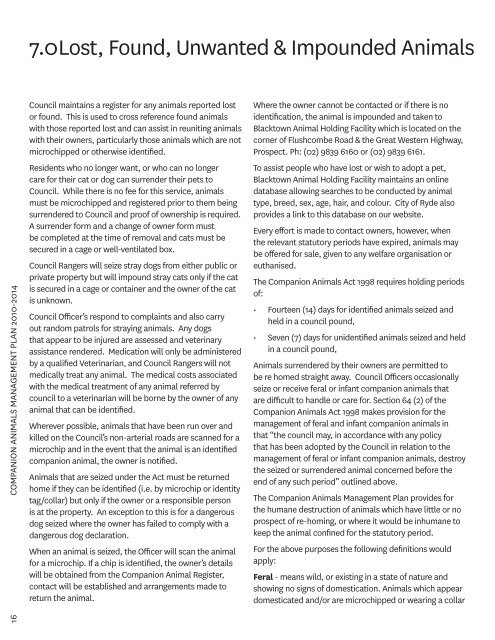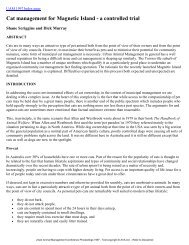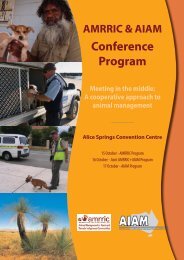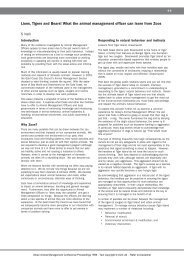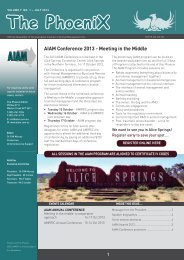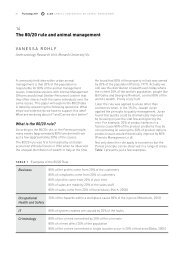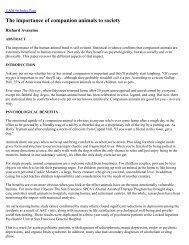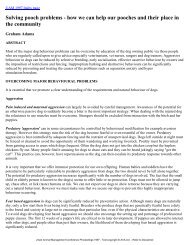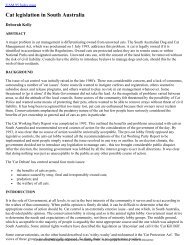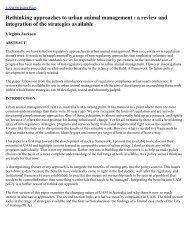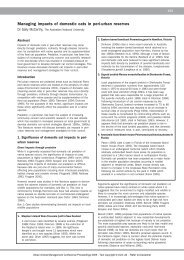Companion Animals Management Plan 2010-2014 - City of Ryde
Companion Animals Management Plan 2010-2014 - City of Ryde
Companion Animals Management Plan 2010-2014 - City of Ryde
You also want an ePaper? Increase the reach of your titles
YUMPU automatically turns print PDFs into web optimized ePapers that Google loves.
7.0 Lost, Found, Unwanted & Impounded <strong>Animals</strong><br />
16 COMPANION ANIMALS MANAGEMENT PLAN <strong>2010</strong>-<strong>2014</strong><br />
Council maintains a register for any animals reported lost<br />
or found. This is used to cross reference found animals<br />
with those reported lost and can assist in reuniting animals<br />
with their owners, particularly those animals which are not<br />
microchipped or otherwise identified.<br />
Residents who no longer want, or who can no longer<br />
care for their cat or dog can surrender their pets to<br />
Council. While there is no fee for this service, animals<br />
must be microchipped and registered prior to them being<br />
surrendered to Council and pro<strong>of</strong> <strong>of</strong> ownership is required.<br />
A surrender form and a change <strong>of</strong> owner form must<br />
be completed at the time <strong>of</strong> removal and cats must be<br />
secured in a cage or well-ventilated box.<br />
Council Rangers will seize stray dogs from either public or<br />
private property but will impound stray cats only if the cat<br />
is secured in a cage or container and the owner <strong>of</strong> the cat<br />
is unknown.<br />
Council Officer’s respond to complaints and also carry<br />
out random patrols for straying animals. Any dogs<br />
that appear to be injured are assessed and veterinary<br />
assistance rendered. Medication will only be administered<br />
by a qualified Veterinarian, and Council Rangers will not<br />
medically treat any animal. The medical costs associated<br />
with the medical treatment <strong>of</strong> any animal referred by<br />
council to a veterinarian will be borne by the owner <strong>of</strong> any<br />
animal that can be identified.<br />
Wherever possible, animals that have been run over and<br />
killed on the Council’s non-arterial roads are scanned for a<br />
microchip and in the event that the animal is an identified<br />
companion animal, the owner is notified.<br />
<strong>Animals</strong> that are seized under the Act must be returned<br />
home if they can be identified (i.e. by microchip or identity<br />
tag/collar) but only if the owner or a responsible person<br />
is at the property. An exception to this is for a dangerous<br />
dog seized where the owner has failed to comply with a<br />
dangerous dog declaration.<br />
When an animal is seized, the Officer will scan the animal<br />
for a microchip. If a chip is identified, the owner’s details<br />
will be obtained from the <strong>Companion</strong> Animal Register,<br />
contact will be established and arrangements made to<br />
return the animal.<br />
Where the owner cannot be contacted or if there is no<br />
identification, the animal is impounded and taken to<br />
Blacktown Animal Holding Facility which is located on the<br />
corner <strong>of</strong> Flushcombe Road & the Great Western Highway,<br />
Prospect. Ph: (02) 9839 6160 or (02) 9839 6161.<br />
To assist people who have lost or wish to adopt a pet,<br />
Blacktown Animal Holding Facility maintains an online<br />
database allowing searches to be conducted by animal<br />
type, breed, sex, age, hair, and colour. <strong>City</strong> <strong>of</strong> <strong>Ryde</strong> also<br />
provides a link to this database on our website.<br />
Every effort is made to contact owners, however, when<br />
the relevant statutory periods have expired, animals may<br />
be <strong>of</strong>fered for sale, given to any welfare organisation or<br />
euthanised.<br />
The <strong>Companion</strong> <strong>Animals</strong> Act 1998 requires holding periods<br />
<strong>of</strong>:<br />
• Fourteen (14) days for identified animals seized and<br />
held in a council pound,<br />
• Seven (7) days for unidentified animals seized and held<br />
in a council pound,<br />
<strong>Animals</strong> surrendered by their owners are permitted to<br />
be re homed straight away. Council Officers occasionally<br />
seize or receive feral or infant companion animals that<br />
are difficult to handle or care for. Section 64 (2) <strong>of</strong> the<br />
<strong>Companion</strong> <strong>Animals</strong> Act 1998 makes provision for the<br />
management <strong>of</strong> feral and infant companion animals in<br />
that “the council may, in accordance with any policy<br />
that has been adopted by the Council in relation to the<br />
management <strong>of</strong> feral or infant companion animals, destroy<br />
the seized or surrendered animal concerned before the<br />
end <strong>of</strong> any such period” outlined above.<br />
The <strong>Companion</strong> <strong>Animals</strong> <strong>Management</strong> <strong>Plan</strong> provides for<br />
the humane destruction <strong>of</strong> animals which have little or no<br />
prospect <strong>of</strong> re-homing, or where it would be inhumane to<br />
keep the animal confined for the statutory period.<br />
For the above purposes the following definitions would<br />
apply:<br />
Feral - means wild, or existing in a state <strong>of</strong> nature and<br />
showing no signs <strong>of</strong> domestication. <strong>Animals</strong> which appear<br />
domesticated and/or are microchipped or wearing a collar


